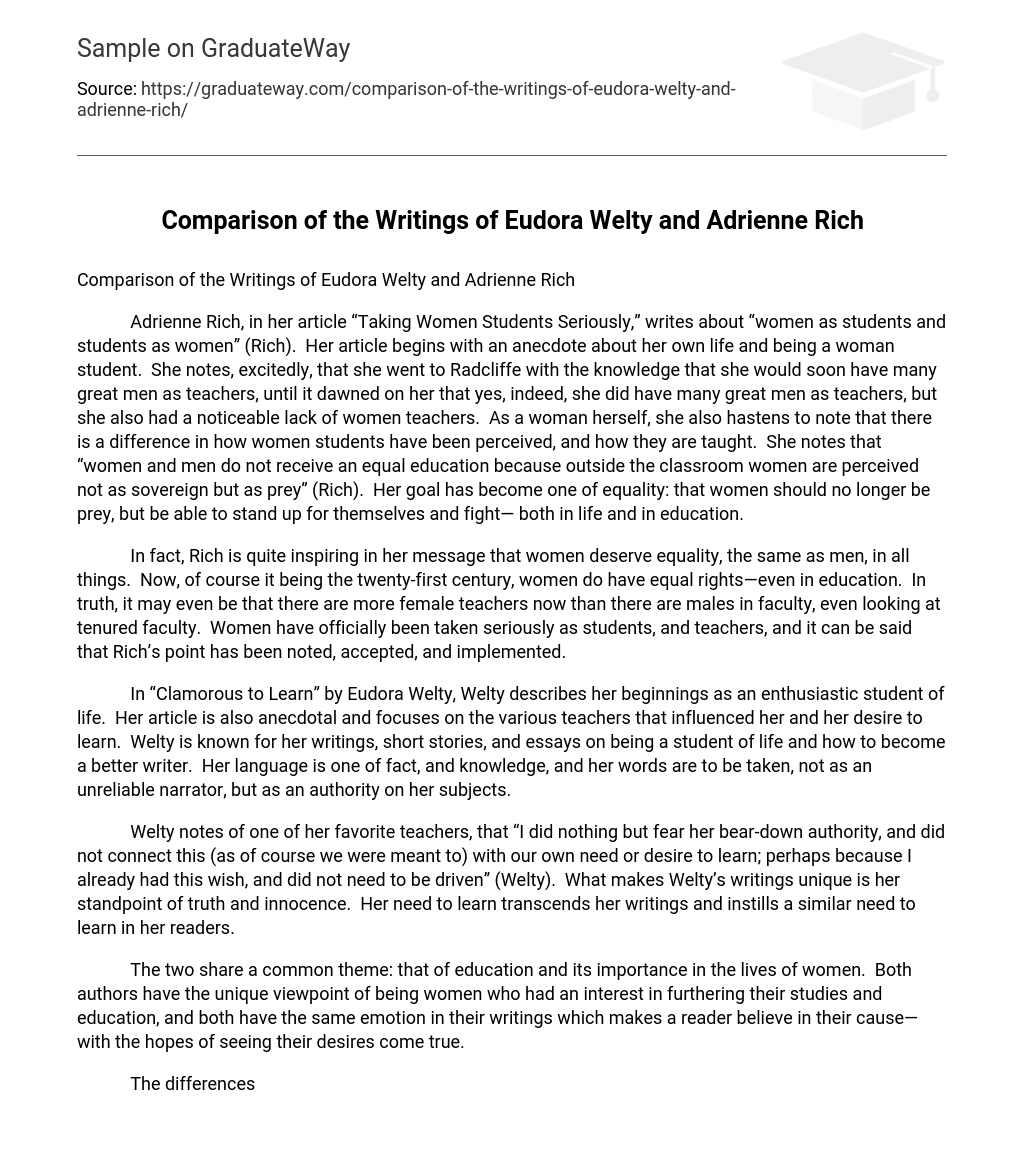Adrienne Rich, in her article “Taking Women Students Seriously,” writes about “women as students and students as women” (Rich). Her article begins with an anecdote about her own life and being a woman student. She notes, excitedly, that she went to Radcliffe with the knowledge that she would soon have many great men as teachers, until it dawned on her that yes, indeed, she did have many great men as teachers, but she also had a noticeable lack of women teachers. As a woman herself, she also hastens to note that there is a difference in how women students have been perceived, and how they are taught. She notes that “women and men do not receive an equal education because outside the classroom women are perceived not as sovereign but as prey” (Rich). Her goal has become one of equality: that women should no longer be prey, but be able to stand up for themselves and fight— both in life and in education.
In fact, Rich is quite inspiring in her message that women deserve equality, the same as men, in all things. Now, of course it being the twenty-first century, women do have equal rights—even in education. In truth, it may even be that there are more female teachers now than there are males in faculty, even looking at tenured faculty. Women have officially been taken seriously as students, and teachers, and it can be said that Rich’s point has been noted, accepted, and implemented.
In “Clamorous to Learn” by Eudora Welty, Welty describes her beginnings as an enthusiastic student of life. Her article is also anecdotal and focuses on the various teachers that influenced her and her desire to learn. Welty is known for her writings, short stories, and essays on being a student of life and how to become a better writer. Her language is one of fact, and knowledge, and her words are to be taken, not as an unreliable narrator, but as an authority on her subjects.
Welty notes of one of her favorite teachers, that “I did nothing but fear her bear-down authority, and did not connect this (as of course we were meant to) with our own need or desire to learn; perhaps because I already had this wish, and did not need to be driven” (Welty). What makes Welty’s writings unique is her standpoint of truth and innocence. Her need to learn transcends her writings and instills a similar need to learn in her readers.
The two share a common theme: that of education and its importance in the lives of women. Both authors have the unique viewpoint of being women who had an interest in furthering their studies and education, and both have the same emotion in their writings which makes a reader believe in their cause—with the hopes of seeing their desires come true.
The differences in the articles are also unambiguous. Eudora Welty is writing as a reflection of her past, what made her into the woman she has become, and who inspired her along the way. Welty’s story is one of bright-eyed innocence, a world where nothing can seem to hinder her desire to learn; not even the teachers providing the knowledge. Adrienne Rich, on the other hand, is writing as a woman who has been there. Her attitude is one of broken desire, of shattered hopes and ruined dreams. She is writing to fight for a woman’s equality, both as a student, and as a teacher, and her words carry the wisdom of many years on the other side.
Overall, much can be gleaned from a study of both articles. Both women are writing from completely separate directions and both have a different meaning behind their words of wisdom. In Welty, a reader is inspired to learn, to take the world as it comes and glean every speck of knowledge out of it. In Rich, a reader is inspired to share in her message of equality, to see women on the forefront of education, equal with men, and even as equal students, without fear or prejudice. In both, however, a reader is instilled with a sense of higher education and the importance to not only have the desire to learn, but to maintain it, against all odds, as well.
Bibliography.
Rich, Adrienne. (1979). Taking Women Students Seriously. On The Contrary, 165-171.
Welty, Eudora. (1984). Clamorous to Learn. One Writer’s Beginnings, 22-26.





